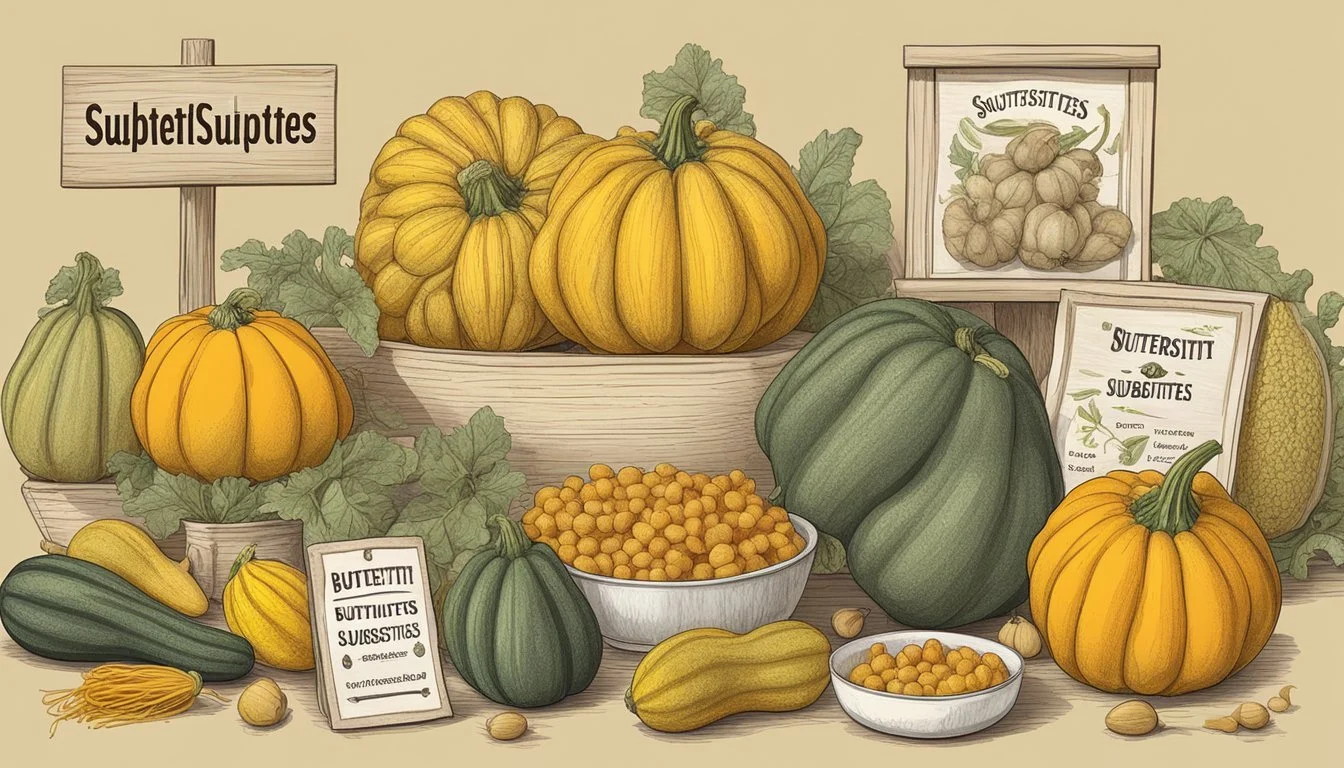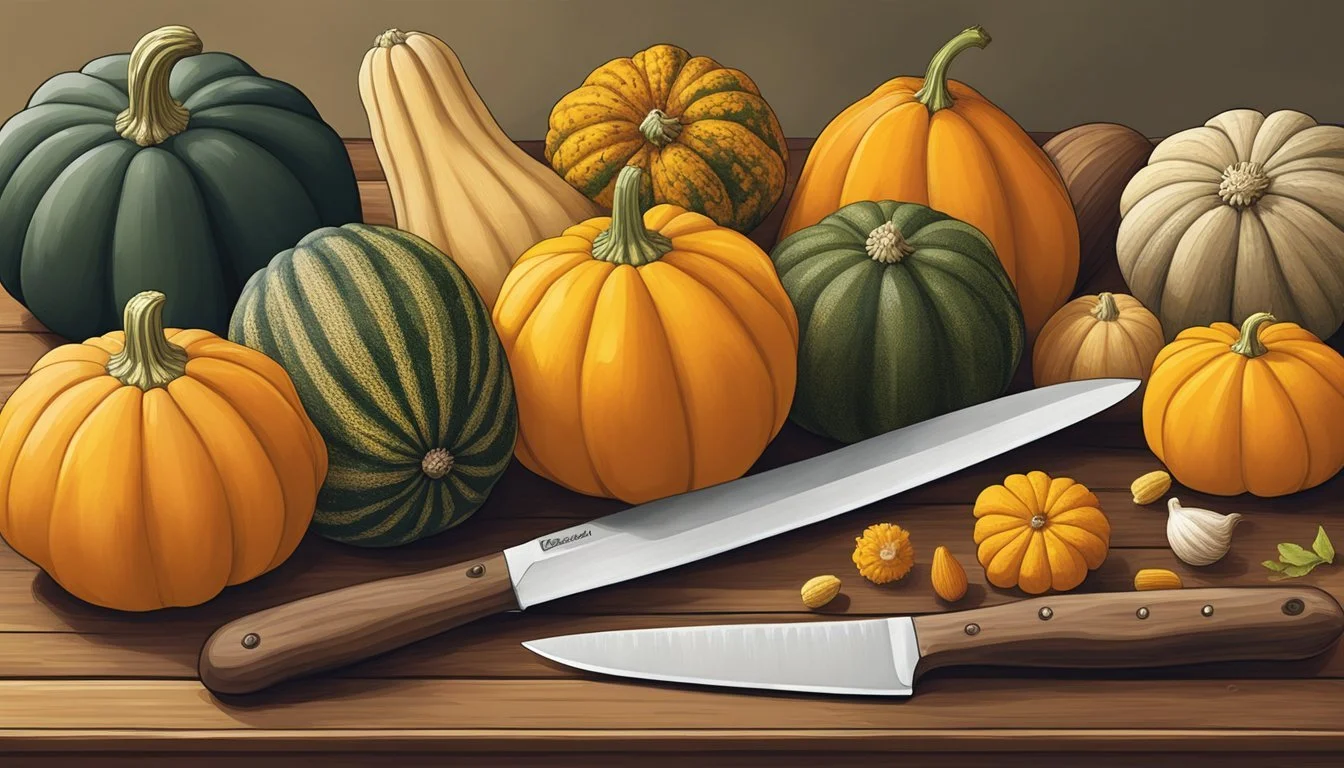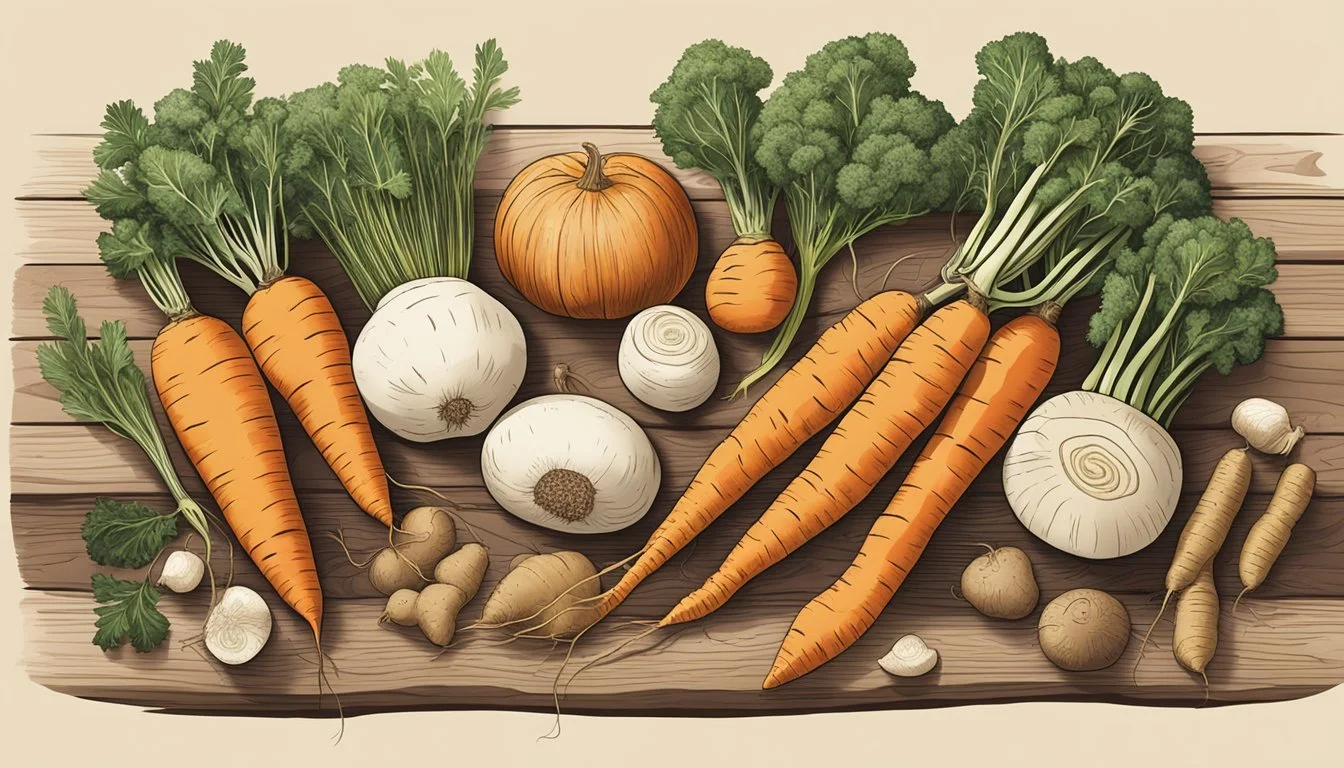Butternut Substitutes
Top Alternatives for Your Recipes
Butternut squash is a versatile vegetable that is often used in a variety of dishes, ranging from soups and stews to casseroles and pies. Its sweet, nutty flavor and smooth texture make it a favorite ingredient in fall and winter recipes. However, there are situations when butternut squash may not be readily available, or someone might be looking for a different nutritional profile or cooking characteristic in their dish.
Fortunately, there are several substitutes that can fill in for butternut squash in recipes. Ingredients such as sweet potatoes, pumpkins, and different varieties of winter squash, like acorn and kabocha, offer similar textures and flavors. Sweet potatoes, with their rich vitamins and minerals, provide a nutritious alternative with a naturally sweet taste. Pumpkins, particularly rich in Vitamin A, can offer a different nutrient accent while still giving a creamy consistency when pureed. Kabocha squash, known for its sweet and nutty flavor, presents a dense flesh that can provide a similar mouthfeel to butternut squash, making it ideal for roasting or mashing.
These substitutes not only mimic the characteristics of butternut squash but also bring their own unique qualities to a dish, allowing for culinary flexibility and creativity in the kitchen. Each alternative has its considerations for preparation and cooking, as there can be differences in texture, sweetness, and moisture content. Chefs and home cooks can choose based on their dietary preferences, availability of ingredients, or the specific requirements of their recipes, knowing these options can successfully replace butternut squash while still achieving a delicious outcome.
Understanding Butternut Squash
Butternut squash is a versatile winter squash known for its sweet taste and creamy texture. This staple ingredient shines in culinary applications and provides valuable nutritional benefits.
Nutritional Value
Butternut squash is a powerhouse of nutrients, low in calories while providing a significant amount of dietary fiber that supports digestive health. It's notably high in vitamins and minerals:
Vitamin A: Essential for eye health and immune function.
Vitamin C: Important for skin health and antioxidants.
Potassium: Key for muscle function and heart health.
Fiber: Beneficial for maintaining a healthy digestive system.
Nutrient Content per 100g Calories 45 Carbs 12 g Fiber 3 g Vitamin A 5320 IU Vitamin C 21 mg Potassium 352 mg
Culinary Uses
Butternut squash's creamy texture makes it ideal for a variety of dishes, including soups and stews, where it blends smoothly into the base. Its naturally sweet flavor enhances both savory and sweet recipes; it can be roasted to bring out a caramelized profile or pureed for use in desserts and baking. This squash can easily be incorporated into dishes such as curries, lasagna, and baked goods, making it an adaptable ingredient for fall-centric recipes.
Common Butternut Squash Substitutes
When considering a substitute for butternut squash, one should look for alternatives that offer a similar sweetness and texture. The best candidates come from the squash family itself, which includes varieties that can be used interchangeably based on their availability during the winter season.
Acorn and Hubbard Squash
Acorn squash has a fibrous and slightly stringy texture, with a subtle sweetness that intensifies when cooked. It's mainly suitable for roasting or baking and is commonly available in the winter months. The Hubbard squash is larger and has a grainier texture, suitable for dishes where a heartier bite is desired.
Substitution Ratio: Replace butternut squash with acorn or Hubbard squash in a 1:1 ratio.
Pumpkin Varieties
Pumpkin is a widely known substitute, particularly the sugar pumpkin, which is praised for its sweet flavor and smooth texture reminiscent of butternut squash. It's perfect for both baking and purees.
Availability: Pumpkin variants are often readily available during the fall and early winter seasons.
Other Squash Types
Other squash types like buttercup, kabocha, and delicata squash also make great substitutes. Kabocha squash, sometimes known as Japanese pumpkin, offers a sweet and nutty taste with a texture that becomes creamy when cooked.
Taste and Texture: Delicata squash is smaller and sweeter, which may require adjusting the amount used.
Substitution Ratio: For kabocha and buttercup squash, use a 1:1 ratio when substituting for butternut squash.
Root Vegetable Alternatives
When seeking to replace butternut squash in a dish, root vegetables offer a variety of textures and flavors that can closely mimic the original ingredient. Chief among these alternatives are sweet potatoes, carrots, and parsnips, each of which can deliver a satisfying sweetness and a hearty, comforting presence to any recipe.
Sweet Potatoes and Carrots
Sweet Potatoes are an excellent alternative to butternut squash due to their comparable sweet, starchy quality. They are a rich source of vitamins, minerals, and fibers. In cooking, sweet potatoes develop a soft texture and deep, sweet flavor that complements both savory and sweet applications. They excel in mashed dishes, soups, and when roasted.
Nutritional Aspect: High in vitamins A and C, lower in calories.
Cooking Tip: Use in a 1:1 ratio for butternut squash in recipes.
Carrots, another nutritious option, can stand in for butternut squash with their sweet, earthy flavor and versatility in both cooked and raw preparations. Their firm texture softens upon cooking, allowing them to puree well for soups, stews, and fillings, and their vibrant color can visually replace the orange hue of butternut squash.
Nutritional Aspect: Good source of beta-carotene, fiber, and antioxidants.
Cooking Tip: Best used when cooked and pureed to mimic the creaminess of butternut squash.
Parsnips and Other Roots
Parsnips, with their distinctly sweet and slightly nutty flavor, serve as another robust substitute for butternut squash. Their creamy texture when cooked makes them particularly suitable for purees, soups, and when used in a roasted vegetable medley.
Nutritional Aspect: Rich in potassium and dietary fiber.
Cooking Tip: Roast or boil and mash for the best flavor and texture resemblance to butternut squash.
Other roots, though not mentioned specifically, can include vegetables like rutabagas and turnips. These typically have a more peppery taste but can be mellowed through cooking to more closely approximate the gentler sweetness of butternut squash.
Cooking Tip: Combine with carrots or sweet potatoes to adjust the flavor profile closer to that of butternut squash.
Using Pumpkin Puree
When considering alternatives to butternut squash, pumpkin puree is an excellent choice due to its similar texture and taste profile. To substitute pumpkin puree for butternut squash in recipes, it is often a one-to-one ratio, meaning one cup of pumpkin puree is equivalent to one cup of butternut squash puree.
Nutritional Content: Pumpkin puree is a nutrient-dense option that provides a wealth of vitamins and minerals. Key nutritional highlights include:
Vitamin A: Prominent for eye health and immune function.
Fiber: Beneficial for digestive health.
Potassium: Important for muscle contractions and heart function.
Here is a breakdown of the substitution ratio and nutritional content:
Entity Substitution Ratio Nutritional Content Pumpkin Puree 1:1 High in Vitamin A, Fiber, Potassium
To ensure the best outcome when using pumpkin puree:
Choose the correct type of pumpkin. Sugar pumpkins, also known as pie pumpkins, are preferable due to their flavor and texture.
Avoid carving pumpkins as they are not bred for consumption and lack the desired sweetness and consistency.
When preparing pumpkin puree from scratch, split the pumpkin, remove the seeds, and roast until tender before pureeing.
Incorporating pumpkin puree as a substitute in recipes calls for precision and attention to moisture content, as it can vary from butternut squash. Cooks may need to adjust the liquid ingredients in the recipe to account for any discrepancy. With its rich vitamins and adaptable texture, pumpkin puree is a reliable and nutritious substitute for butternut squash in many culinary applications.
Frozen Substitutes for Convenience
When fresh butternut squash is not available or if convenience is a priority, frozen butternut squash is an excellent alternative. Frozen selections are readily accessible year-round in many grocery stores, making them a dependable standby for a variety of recipes.
One of the best aspects of using frozen squash is that it eliminates prep work: no peeling, seeding, or cubing is necessary. This can save considerable time in the kitchen, especially for busy cooks looking to streamline their meal preparation.
Here's what one needs to know about using frozen butternut squash as a substitute:
Substitution Ratio: The replacement is straightforward—a 1:1 ratio. This means that one cup of frozen butternut squash equates to one cup of fresh squash.
Texture and Flavor: Frozen squash may have a slightly different texture after thawing; it can be a bit softer than fresh. However, the flavor remains robust and can be used seamlessly in most recipes that call for butternut squash such as soups, stews, and casseroles.
Thawing: It's not necessary to thaw frozen butternut squash before cooking. They can be added directly to the dish being prepared.
To sum up the main points about frozen butternut squash:
Attribute Details Availability Found year-round in supermarkets Preparation No peeling or seeding required Substitution Equal ratio; 1 cup frozen = 1 cup fresh Texture Slightly softer than fresh, retains flavor well Cooking Usage Can be used directly from frozen
Frozen butternut squash is a practical and effective choice for those seeking to maximize their time in the kitchen without compromising on taste or quality.





